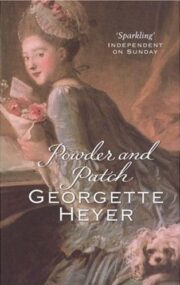The tears were running down her cheeks, but she kept her head turned away. “Please-go! “she begged huskily.
He was coming across the room towards her …. Cleone gripped her hands. “Cleone … dearest!”
A heartbroken sob betrayed her. Philip took her in his arms. “My sweetheart! Crying? Oh no, no! There is naught now to distress you.” The feel of his arms about her was sheer bliss; their strength was like a haven of refuge. Yet Cleone tried to thrust him away.
“What-must you-think of me!” she sobbed. He drew her closer, till her head rested against his shoulder.
“Why, that you are a dear, foolish, naughty little Cleone. Chérie, don’t cry. It is only your Philip-your own Philip, who has always loved you, and only you. Look up, my darling, look up!”
Cleone gave way to the insistence of his arms,
“Oh, Philip-forgive me!” she wept. “I have-been mad!” She raised her head and Philip’s arms tightened still more. He bent over her and kissed her parted lips almost fiercely.
Later, seated beside him on the couch, her head on his shoulder, and his arm about her, Cleone gave a great sigh.
“But why-why did you treat me so-hatefully-when you-came back, Philip?” “I was hurt, darling, and wished to see whether you wanted the real me-or a painted puppet. But then you changed suddenly-and I knew not what to think.” Cleone nestled closer.
“Because I thought you-did not care! But oh, Philip, Philip, I have been so unhappy!” Philip promptly kissed her.
“And-last night-Philip, you don’t think I-”
“Sweetheart! Is it likely that I’d believe ill of you?” She hid her face.
“I-I believed-ill-of you,” she whispered. “But you do not believe it now, sweetheart?”
“No, oh no! But-but-that duel with Mr Bancroft. Was it-was it-some-French lady?” Philip was silent for a moment.
“No, Cleone. That is all I can say.”
“Was it”-her voice was breathless-“was it-me?” Philip did not answer.
“It was! How wonderful!” Philip started.
“You are pleased, Cleone? Pleased?”
“Of course I am! I-oo!” She gave a little wriggle of delight “Why did you not tell me?” “It is not-one of the things one tells one’s lady-love,” said Philip. “Oh! And today? How did you-persuade Sir Deryk?” “Through the arm. But he had no intention of holding you to your word.” Cleone grew rather rigid
“Oh-indeed? In-deed?” Philip was mystified.
“You did not want to be held to it, did you, chérie?” “N-no. But-I don’t like him, Philip.”
“I did not, I confess. I think I do now.” “Do you? And what of James?” “Oh, James! He will recover.”
There was a pause while Cleone digested this. “Philip?”
“Cleone?”
“You-you-don’t care for Jenny, do you?” “Jenny? Cleone, for shame! Because I was polite-” “More than that, Philip!”
“Well, dearest, no one paid any heed to her or was kind. What would you?” “It was only that-I thought-I thought-”
“Cleone, you think too much,” he chid her. “Next you will accuse me of loving Ann Nutley!” It was a master stroke, and he knew it.
“You didn’t? Not a tiny bit?”
“Not an atom!”
“And no one-in Paris?”
“No one. I have pretended, but they all knew that I had already lost my heart.” “You pretended ….? Oh!”
“One must, sweetest.” “But-”
He drew her closer.
“But never, most beautiful, did I become engaged-twice in one evening!” He stifled the cry that rose to her lips.
“Philip, that is ungallant, and-and hateful!” He laughed.
“Is it not? Ah, Cleone! Tell me, my dearest, what is in your locket?” “Something I meant to burn,” she murmured.
“But did not?”
“No-I could not.” She fumbled at her bosom and drew out the trinket. “See for yourself, Philip.”
He opened it. A rolled lock of brown hair fell out and a torn scrap of parchment. Philip turned
it over.
“Yours till death, Philip,” he read. “Cleone, my love.” She buried her face on his shoulder.
“Your-hair-your poor hair!” she said. “All gone! Look up, Cleone!”
She lifted her face. He gazed down at her, rapt.
“Oh, Cleone-I shall write a sonnet to your wonderful eyes! he breathed.


"Powder and Patch" отзывы
Отзывы читателей о книге "Powder and Patch". Читайте комментарии и мнения людей о произведении.
Понравилась книга? Поделитесь впечатлениями - оставьте Ваш отзыв и расскажите о книге "Powder and Patch" друзьям в соцсетях.